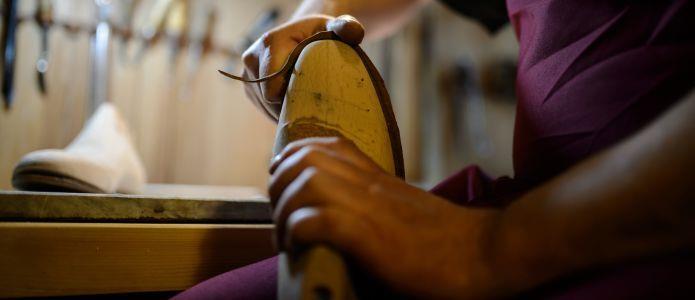Develop creative industry to stir innovation
The Goethe-Institut Namibia and the Deutsche Gesellschaft für Internationale Zusammenarbeit (GIZ), on behalf of the German government, have partnered to offer creative entrepreneurs in Namibia the opportunity to submit their business ideas in order to participate in a business incubation programme for skills development and business growth.
Applications for the Creative Entrepreneurship Programme (CEP) are only accepted electronically. Twelve businesses will be selected in fields including fashion, design, advertising, jewellery, beauty, upholstery and gaming. Each business idea is selected on its own merit.
“The creative industries have been identified as a highly potential sector of the Namibian economy and very often, business ideas do not develop or are not sustainable because a person has a credible idea but lacks the basics of areas including administration, finances and marketing,” said Goethe-Institut Namibia director Daniel Stoevesandt.
He said the CEP would prefer applications by groups no larger than six persons for the various one- to two-day events that will be held over weekends from May to November 2020.
The CEP is not a financing programme for start-ups and an 80% participation is required from beneficiaries, who are to receive the incubation services under the GIZ Start-Up Namibia Programme, supported to the tune of N$300 000 by the German government.
GIZ project manager Anna Vambe explained the rationale behind the Start-Up Namibia initiative that has been in operation since 2019.
“The environment for establishing and upscaling the operations of start-ups in Namibia is inadequate in terms of supporting the small and medium enterprises for them to develop a sustainable business model that creates employment, offers competition in the markets and spurs innovation,” she said.
The CEP will thus offer creative entrepreneurs access to information and practices concerning business development, entrepreneurial self-understanding, design thinking, marketing, customer research, branding, sales, legal principles, establishing partnerships, insurance, finances management, health and other aspects important for a business to grow.
Vambe said start-ups are vital for economic growth.
“Start-ups can, for instance, combine innovative technical solutions with traditional industries to open new opportunities, such as developing digital products and services that in the end have great potential to be key growth drivers. The creative economy offers an active playground for tech-integrated solutions and new business models,” she said.
Another important component of the CEP is peer-to-peer development and a mentoring programme that will connect the creative entrepreneurs with others already established in the relevant fields.
Stoevesandt explained the importance of partnerships.
“The creative industries, as any others, sometimes need specialised advice for creative entrepreneurs to be more receptive to partnerships and learn from others’ failures that may be imminent in a particular economy. At the same time, the CEP will apply technology to give Namibian entrepreneurs access to the experiences and lessons learnt by entrepreneurs in the same sectors but in a different geographical location for them to share ideas and potentially develop solutions tailored to Namibia,” he said.
Registration for the CEP allows for data uploads in PDF, JPG and/or PNG format. Double or incomplete applications will not be considered. Contact [email protected] for more information after visiting the link provided in this statement. Shortlisted candidates will be invited to present their business ideas in person.
Applications for the Creative Entrepreneurship Programme (CEP) are only accepted electronically. Twelve businesses will be selected in fields including fashion, design, advertising, jewellery, beauty, upholstery and gaming. Each business idea is selected on its own merit.
“The creative industries have been identified as a highly potential sector of the Namibian economy and very often, business ideas do not develop or are not sustainable because a person has a credible idea but lacks the basics of areas including administration, finances and marketing,” said Goethe-Institut Namibia director Daniel Stoevesandt.
He said the CEP would prefer applications by groups no larger than six persons for the various one- to two-day events that will be held over weekends from May to November 2020.
The CEP is not a financing programme for start-ups and an 80% participation is required from beneficiaries, who are to receive the incubation services under the GIZ Start-Up Namibia Programme, supported to the tune of N$300 000 by the German government.
GIZ project manager Anna Vambe explained the rationale behind the Start-Up Namibia initiative that has been in operation since 2019.
“The environment for establishing and upscaling the operations of start-ups in Namibia is inadequate in terms of supporting the small and medium enterprises for them to develop a sustainable business model that creates employment, offers competition in the markets and spurs innovation,” she said.
The CEP will thus offer creative entrepreneurs access to information and practices concerning business development, entrepreneurial self-understanding, design thinking, marketing, customer research, branding, sales, legal principles, establishing partnerships, insurance, finances management, health and other aspects important for a business to grow.
Vambe said start-ups are vital for economic growth.
“Start-ups can, for instance, combine innovative technical solutions with traditional industries to open new opportunities, such as developing digital products and services that in the end have great potential to be key growth drivers. The creative economy offers an active playground for tech-integrated solutions and new business models,” she said.
Another important component of the CEP is peer-to-peer development and a mentoring programme that will connect the creative entrepreneurs with others already established in the relevant fields.
Stoevesandt explained the importance of partnerships.
“The creative industries, as any others, sometimes need specialised advice for creative entrepreneurs to be more receptive to partnerships and learn from others’ failures that may be imminent in a particular economy. At the same time, the CEP will apply technology to give Namibian entrepreneurs access to the experiences and lessons learnt by entrepreneurs in the same sectors but in a different geographical location for them to share ideas and potentially develop solutions tailored to Namibia,” he said.
Registration for the CEP allows for data uploads in PDF, JPG and/or PNG format. Double or incomplete applications will not be considered. Contact [email protected] for more information after visiting the link provided in this statement. Shortlisted candidates will be invited to present their business ideas in person.










Comments
Namibian Sun
No comments have been left on this article